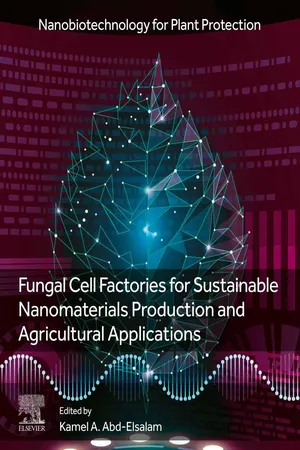
eBook - ePub
Fungal Cell Factories for Sustainable Nanomaterials Productions and Agricultural Applications
- 822 pages
- English
- ePUB (mobile friendly)
- Available on iOS & Android
eBook - ePub
Fungal Cell Factories for Sustainable Nanomaterials Productions and Agricultural Applications
About this book
Fungal Cell Factories for Sustainable Nanomaterials Productions and Agricultural Applications explores the mycogenic synthesis of many metal nanoparticles, including processing processes, environmental protection, and future perspectives. Nanomaterials, including silver, gold, palladium, copper, zinc, selenium, titanium dioxide, metal sulphide, cellulose, have been formed by major fungal genes, such as mushrooms, Fusarium, Trichoderma, endophytic fungi, and yeast, in addition to lichens. Understanding the exact process involved in the synthesis of nanoparticles and the effects of various factors on the reduction of metal ions can help to improve low-cost strategies for the synthesis and extraction of nanoparticles.
Other sections focus on a new framework for the production of nano-antimicrobial, the use of myconanoparticles against plant diseases, post-harvest antibiotics, mycotoxin control and plant pests in addition to certain animal pathogens. Myconanomaterials are well developed with great potential and promise for advanced diagnostics, biosensors, precision farming and targeted smart delivery systems.
- Assesses the impact of a variety of copper-based nanostructures on agri-food sectors, addressing the most relevant knowledge gaps
- Explores the opportunities that myconanotechnology can provide for industrial applications
- Explains the major challenges of applying myconanotechnology at an industrial scale
Frequently asked questions
Yes, you can cancel anytime from the Subscription tab in your account settings on the Perlego website. Your subscription will stay active until the end of your current billing period. Learn how to cancel your subscription.
No, books cannot be downloaded as external files, such as PDFs, for use outside of Perlego. However, you can download books within the Perlego app for offline reading on mobile or tablet. Learn more here.
Perlego offers two plans: Essential and Complete
- Essential is ideal for learners and professionals who enjoy exploring a wide range of subjects. Access the Essential Library with 800,000+ trusted titles and best-sellers across business, personal growth, and the humanities. Includes unlimited reading time and Standard Read Aloud voice.
- Complete: Perfect for advanced learners and researchers needing full, unrestricted access. Unlock 1.4M+ books across hundreds of subjects, including academic and specialized titles. The Complete Plan also includes advanced features like Premium Read Aloud and Research Assistant.
We are an online textbook subscription service, where you can get access to an entire online library for less than the price of a single book per month. With over 1 million books across 1000+ topics, we’ve got you covered! Learn more here.
Look out for the read-aloud symbol on your next book to see if you can listen to it. The read-aloud tool reads text aloud for you, highlighting the text as it is being read. You can pause it, speed it up and slow it down. Learn more here.
Yes! You can use the Perlego app on both iOS or Android devices to read anytime, anywhere — even offline. Perfect for commutes or when you’re on the go.
Please note we cannot support devices running on iOS 13 and Android 7 or earlier. Learn more about using the app.
Please note we cannot support devices running on iOS 13 and Android 7 or earlier. Learn more about using the app.
Yes, you can access Fungal Cell Factories for Sustainable Nanomaterials Productions and Agricultural Applications by Kamel A Abd-Elsalam,Kamel A. Abd-Elsalam in PDF and/or ePUB format, as well as other popular books in Economía & Teoría económica. We have over one million books available in our catalogue for you to explore.
Information
Table of contents
- Fungal Cell Factories for Sustainable Nanomaterials Production and Agricultural Applications
- Cover
- Title Page
- Copyright Page
- Table of Contents
- Contributors
- Series preface
- Preface
- Chapter 1 Fungal nanotechnology for improving farm productivity and sustainability: A note from the editor
- Chapter 2 Fungal-mediated synthesis of gold nanoparticles and their biological applications
- Chapter 3 Mycogenic silver nanoparticles: Synthesis, mechanisms, and biological applications
- Chapter 4 Fungal synthesis of copper nanoparticles and their applications in agri-food, environmental, and biomedical sectors
- Chapter 5 Fungal synthesis of zinc oxide nanoparticles and its applications in biomedical, environmental, and agri-food sectors
- Chapter 6 Recent breakthroughs set by fungal enzymes in the biosynthesis of nanoparticles
- Chapter 7 Synthesis of metal nanoparticles using lichens and their biological applications
- Chapter 8 Mushroom factories for the production metal nanoparticles and their antimicrobial applications
- Chapter 9 Mycosynthesis of titanium dioxide (TiO2) nanoparticles and their applications
- Chapter 10 Microbial cell factories for green synthesis metal sulfide nanoparticle: A sustainable approach for biomedical and agroecosystem applications
- Chapter 11 Cellulose degrading fungi: Nanocellulose production and its agri-environmental applications
- Chapter 12 Fungal and yeast-mediated biosynthesis of metal nanoparticles: Characterization and bio applications
- Chapter 13 Marine fungi and yeast: A green approach for production of bionanoparticles
- Chapter 14 Endophytic fungi-derived biogenic nanoparticles: Mechanisms and applications
- Chapter 15 Mycogenic nanoparticles: synthesis, risk assessment, safety, and regulation
- Chapter 16 Mycosynthesis of metal-based nanoparticles and their perspectives in agri-food and veterinary/medical applications
- Chapter 17 Myconanoparticles for management of various biotic and abiotic stresses in plants
- Chapter 18 Nanobiotechnological strategies for detection of mycotoxins in food products
- Chapter 19 Fungal nanobionics: Principle, advances and applications
- Chapter 20 Antimicrobial applications of mycogenic metal and metal oxide nanoparticles
- Chapter 21 Role of fungi-mediated nanoparticles in mitigation of biotic and abiotic stresses in plants
- 1: Introduction
- Chapter 22 Mycogenic nanoparticles and their applications as antimicrobial and antibiofilm agents in postharvest stage
- Chapter 23 An overview of myconanoparticles applications in veterinary medicine
- Chapter 24 Potentials of mycosynthesized nanomaterials for efficient remediation of environmental contaminants
- Chapter 25 Advances in nanotechnology-based strategies for the point-of-care detection of pathogenic fungi
- Chapter 26 Fungal-derived nanoparticles for the control of plant pathogens and pests
- Index